This handles triggers, buttons, altars and associated objects. More...

Go to the source code of this file.
Defines | |
| #define | ARCH_SACRIFICE(xyz) ((xyz)->slaying) |
| #define | NROF_SACRIFICE(xyz) ((uint32)(xyz)->stats.food) |
Functions | |
| void | add_button_link (object *button, mapstruct *map, int connected) |
| Links specified object in the map. | |
| void | animate_turning (object *op) |
| Animates one step of object. | |
| int | check_altar_sacrifice (const object *altar, const object *sacrifice, int remove_others, int *toremove) |
| Checks whether the altar has enough to sacrifice. | |
| void | check_inv (object *op, object *trig) |
| Function to search the inventory, of a player and then based on a set of conditions, the square will activate connected items. | |
| object * | check_inv_recursive (object *op, const object *trig) |
| Checks object and its inventory for specific item. | |
| int | check_trigger (object *op, object *cause) |
| static objectlink * | get_button_links (const object *button) |
| Return the first objectlink in the objects linked to this one. | |
| int | get_button_value (const object *button) |
| Returns the first value linked to this button. | |
| static int | matches_sacrifice (const object *altar, const object *sacrifice) |
| Helper function to check if the item matches altar's requested sacrifice. | |
| int | operate_altar (object *altar, object **sacrifice) |
| Checks if sacrifice was accepted and removes sacrificed objects. | |
| void | push_button (object *op) |
| Push the specified object. | |
| void | remove_button_link (object *op) |
| Remove the object from the linked lists of buttons in the map. | |
| void | trigger_connected (objectlink *ol, object *cause, const int state) |
| Trigger every object in an objectlink. | |
| static void | trigger_move (object *op, int state) |
| void | update_button (object *op) |
| Updates everything connected with the button op. | |
| void | update_buttons (mapstruct *m) |
| Updates every button on the map (by calling update_button() for them). | |
| void | use_trigger (object *op) |
| Toggles the state of specified button. | |
| void | verify_button_links (const mapstruct *map) |
| This does a minimal check of the button link consistency for object map. | |
Detailed Description
This handles triggers, buttons, altars and associated objects.
Definition in file button.c.
Define Documentation
| #define ARCH_SACRIFICE | ( | xyz | ) | ((xyz)->slaying) |
Definition at line 291 of file button.c.
Referenced by check_altar_sacrifice(), and matches_sacrifice().
| #define NROF_SACRIFICE | ( | xyz | ) | ((uint32)(xyz)->stats.food) |
Definition at line 292 of file button.c.
Referenced by check_altar_sacrifice().
Function Documentation
| void add_button_link | ( | object * | button, |
| mapstruct * | map, | ||
| int | connected | ||
| ) |
Links specified object in the map.
- Parameters:
-
button object to link. Must not be NULL. map map we are on. Should not be NULL. connected connection value for the item.
Definition at line 663 of file button.c.
References mapdef::buttons, FLAG_IS_LINKED, free_objectlink(), get_objectlink(), get_objectlinkpt(), llevError, LOG(), and SET_FLAG.
Referenced by apply_builder_item(), and include_map_in_map().
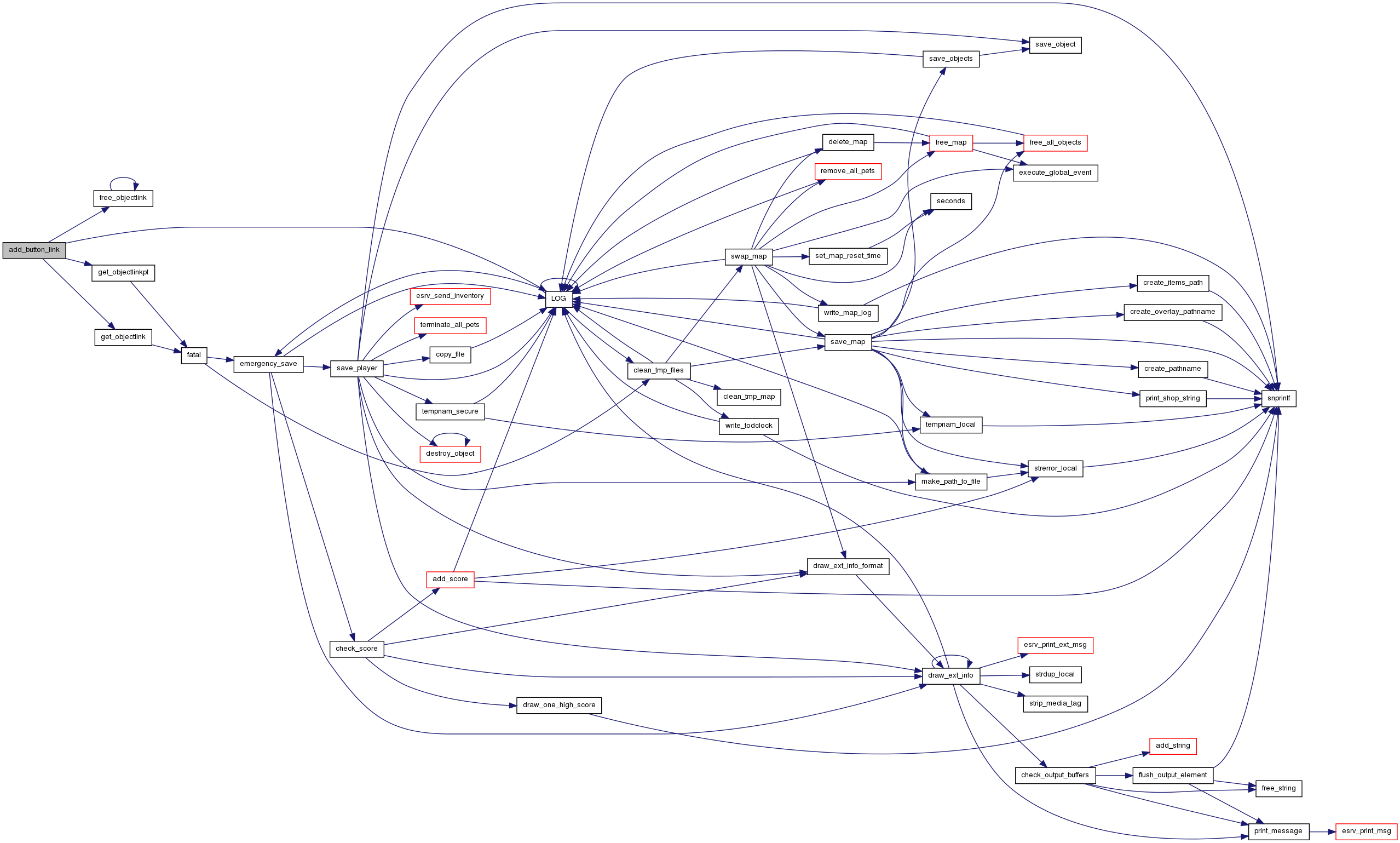
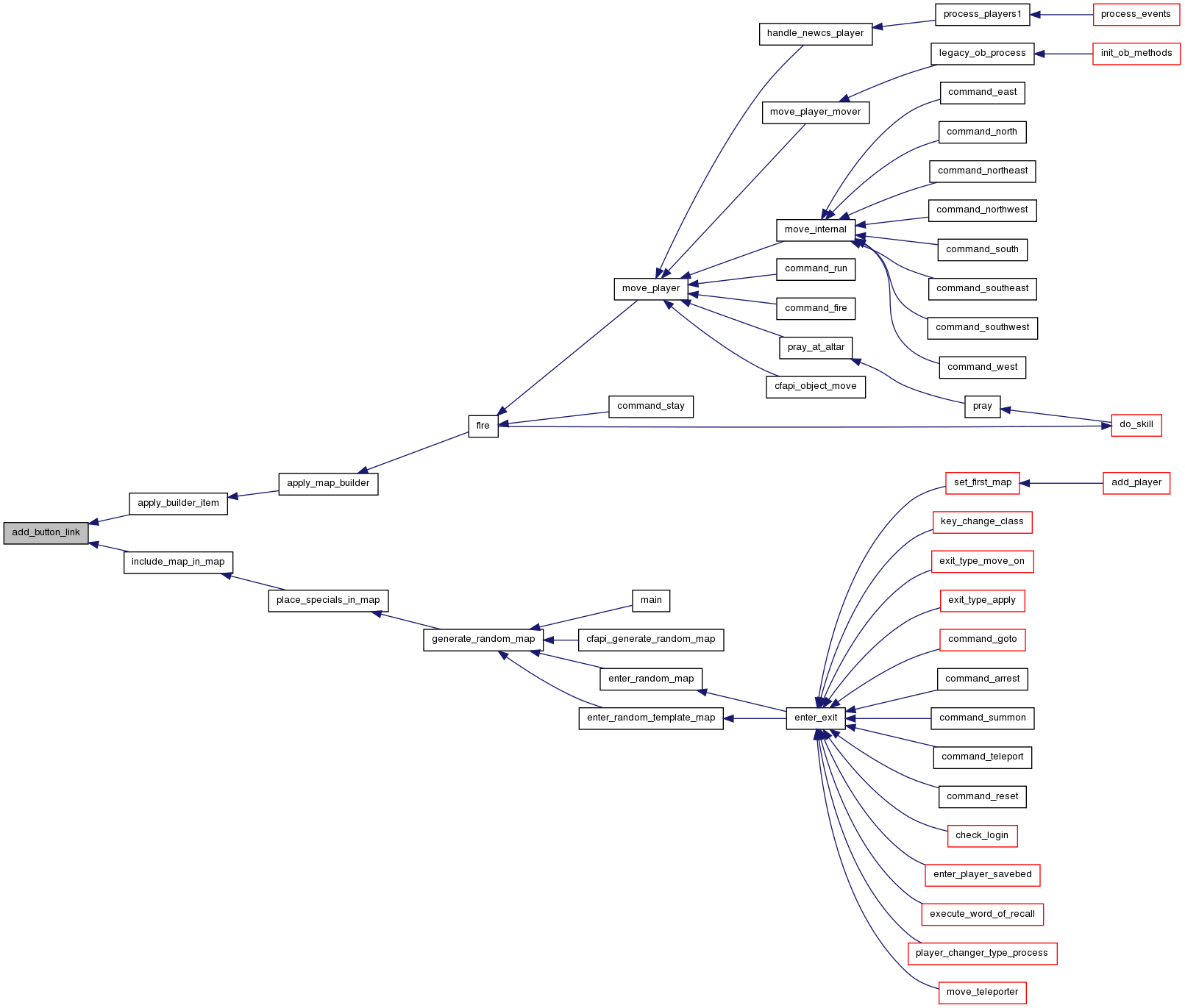
| void animate_turning | ( | object * | op | ) |
Animates one step of object.
- Parameters:
-
op object to animate.
- Note:
- animate_object() should be used instead of this, but it can't handle animations in the 8 directions
- Todo:
- check if object is really animated?
Definition at line 284 of file button.c.
References NUM_ANIMATIONS, SET_ANIMATION, and update_object().
Referenced by legacy_ob_process(), and trigger_connected().
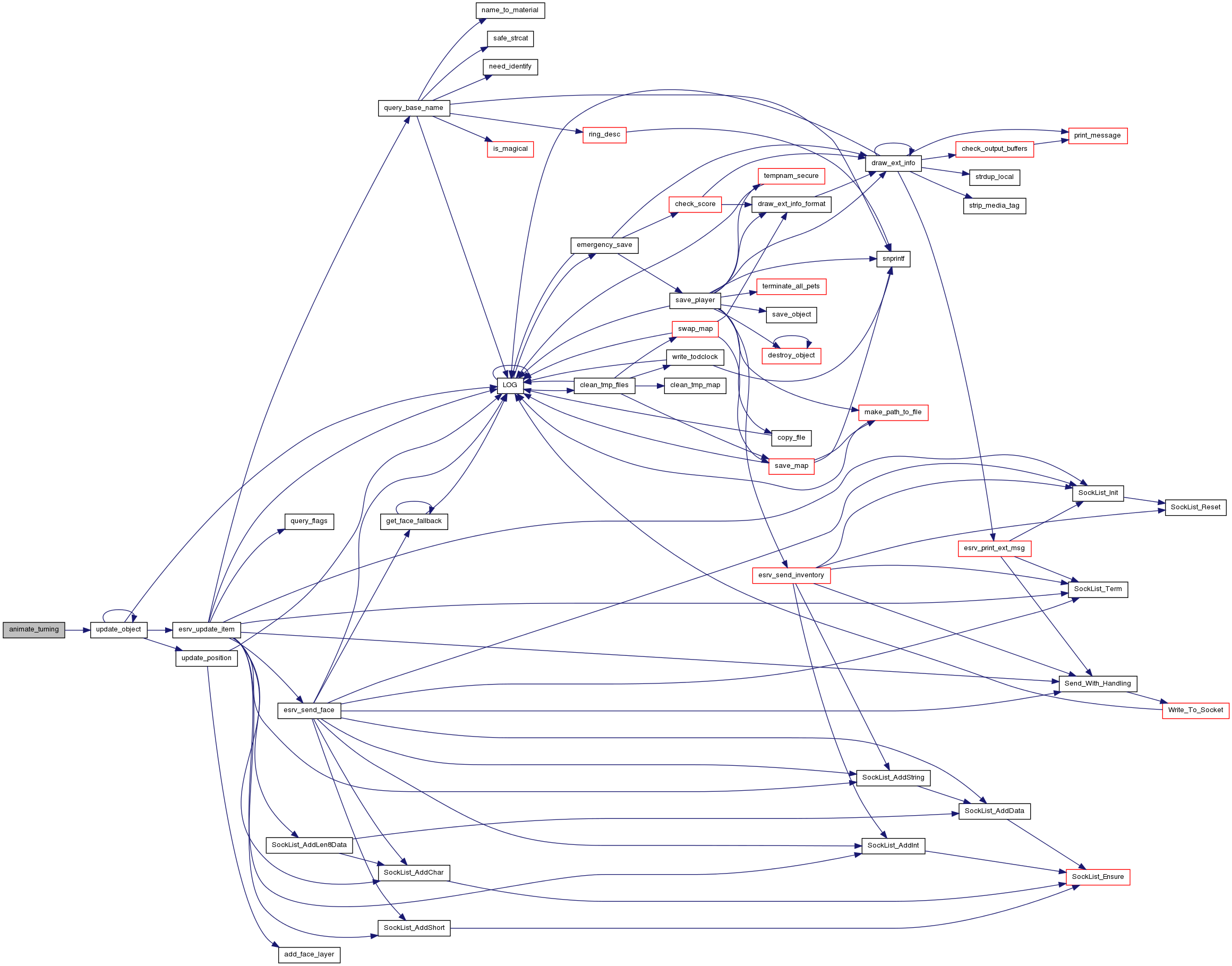
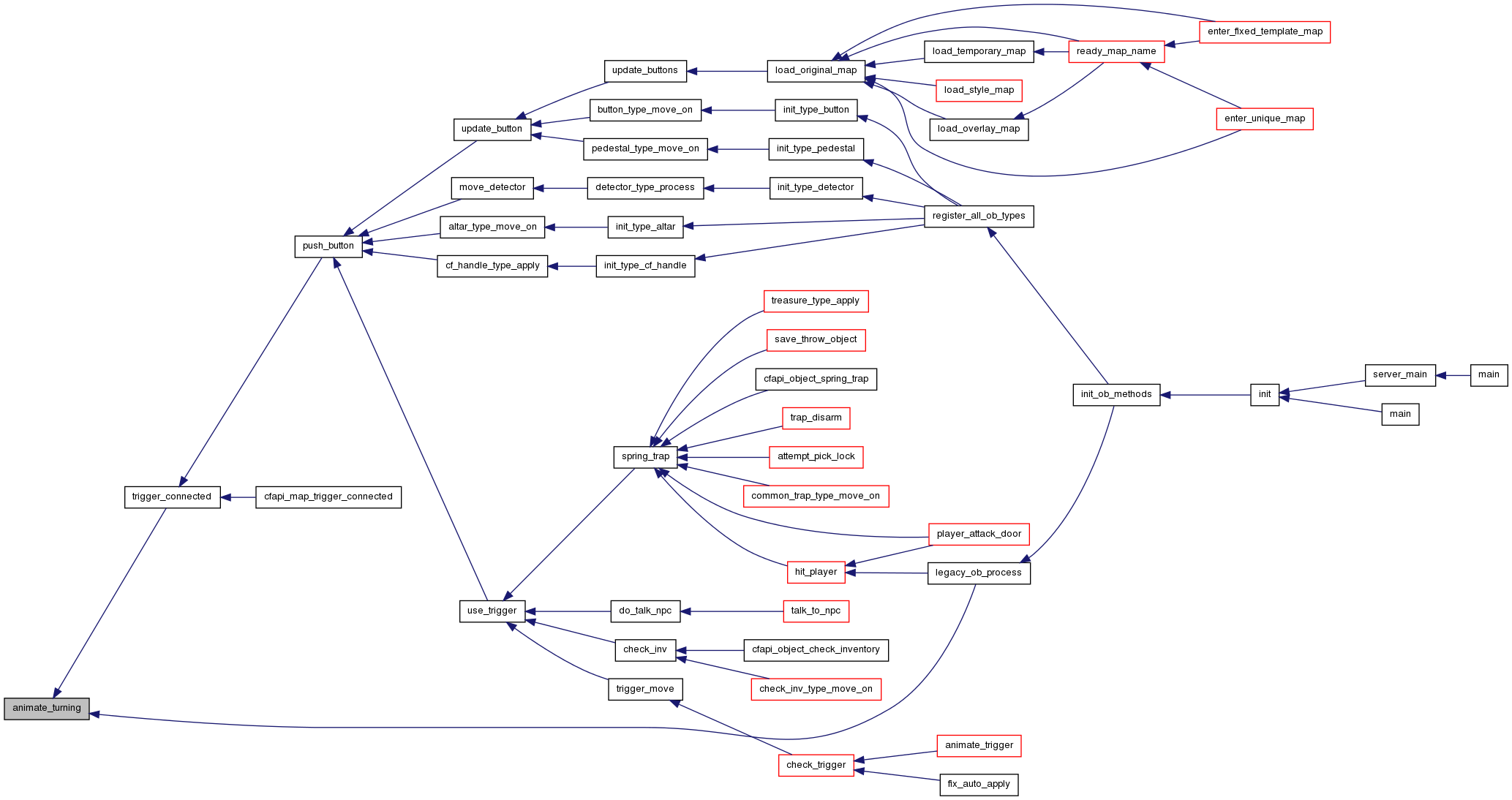
| int check_altar_sacrifice | ( | const object * | altar, |
| const object * | sacrifice, | ||
| int | remove_others, | ||
| int * | toremove | ||
| ) |
Checks whether the altar has enough to sacrifice.
Function put in (0.92.1) so that identify altars won't grab money unnecessarily - we can see if there is sufficient money, see if something needs to be identified, and then remove money if needed.
0.93.4: Linked objects (ie, objects that are connected) can not be sacrificed. This fixes a bug of trying to put multiple altars/related objects on the same space that take the same sacrifice.
The function will now check for all items sitting on the altar, so that the player can put various matching but non merging items on the altar.
This function can potentially remove other items, if remove_others is set.
- Parameters:
-
altar item to which there is a sacrifice sacrifice object that may be sacrifed remove_others if 1, will remove enough items apart sacrifice to compensate for not having enough in sacrifice itself. [out] toremove will contain the nrof of sacrifice to really remove to finish operating. Will be set if not NULL only if the function returns 1.
- Returns:
- 1 if the sacrifice meets the needs of the altar, 0 else
Definition at line 355 of file button.c.
References ARCH_SACRIFICE, decrease_ob_nr(), FLAG_UNPAID, llevError, LOG(), matches_sacrifice(), NROF_SACRIFICE, QUERY_FLAG, and remove_ob().
Referenced by identify_altar_type_move_on(), and operate_altar().
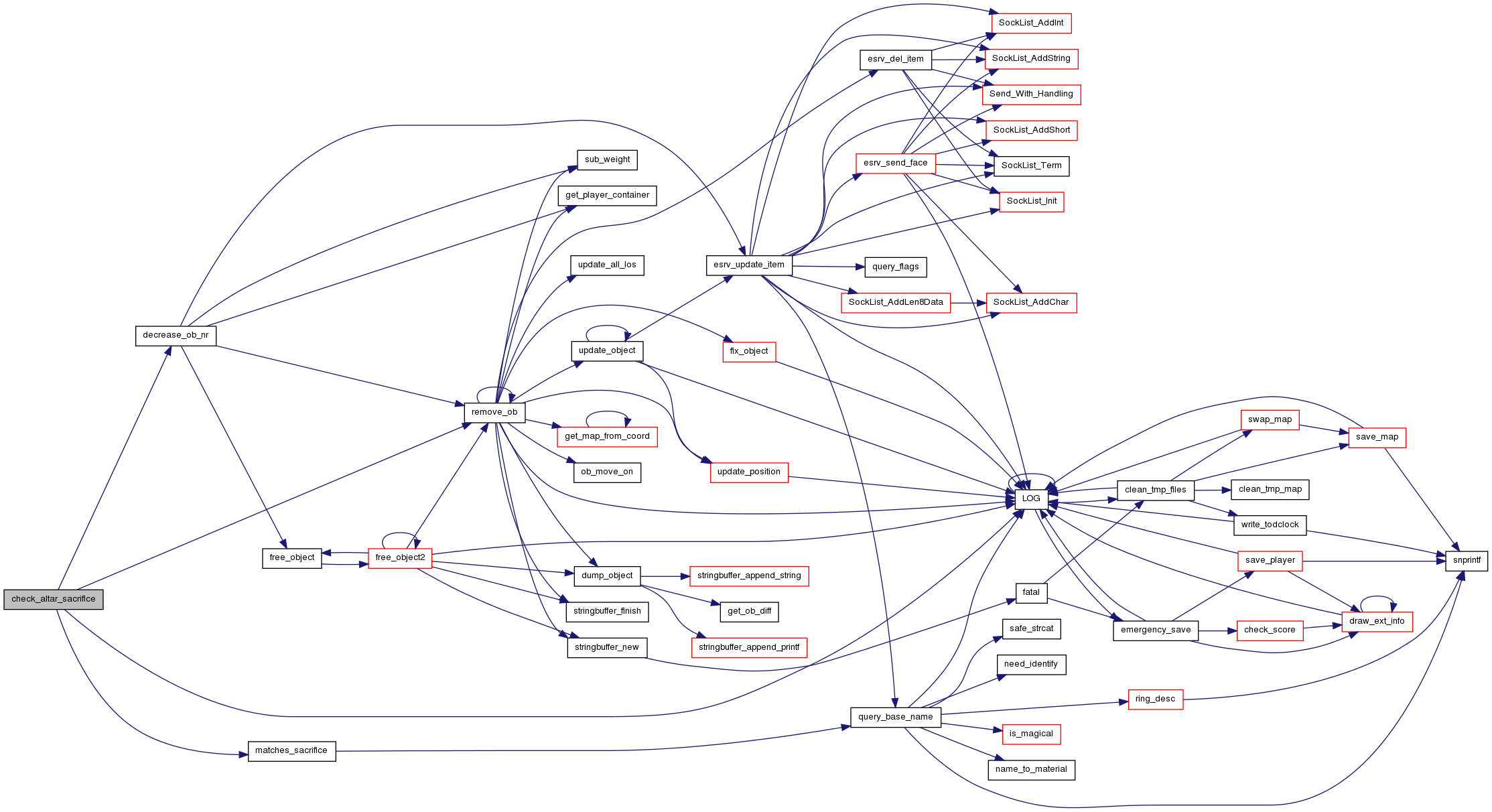

| void check_inv | ( | object * | op, |
| object * | trig | ||
| ) |
Function to search the inventory, of a player and then based on a set of conditions, the square will activate connected items.
Monsters can't trigger this square (for now) Values are: last_sp = 1/0 obj/no obj triggers last_heal = 1/0 remove/dont remove obj if triggered -b.t. (thomas@nomad.astro.psu.edu
- Parameters:
-
op object to check. Must be a player. trig trigger object that may be activated.
Definition at line 828 of file button.c.
References check_inv_recursive(), decrease_ob, PLAYER, and use_trigger().
Referenced by cfapi_object_check_inventory(), and check_inv_type_move_on().
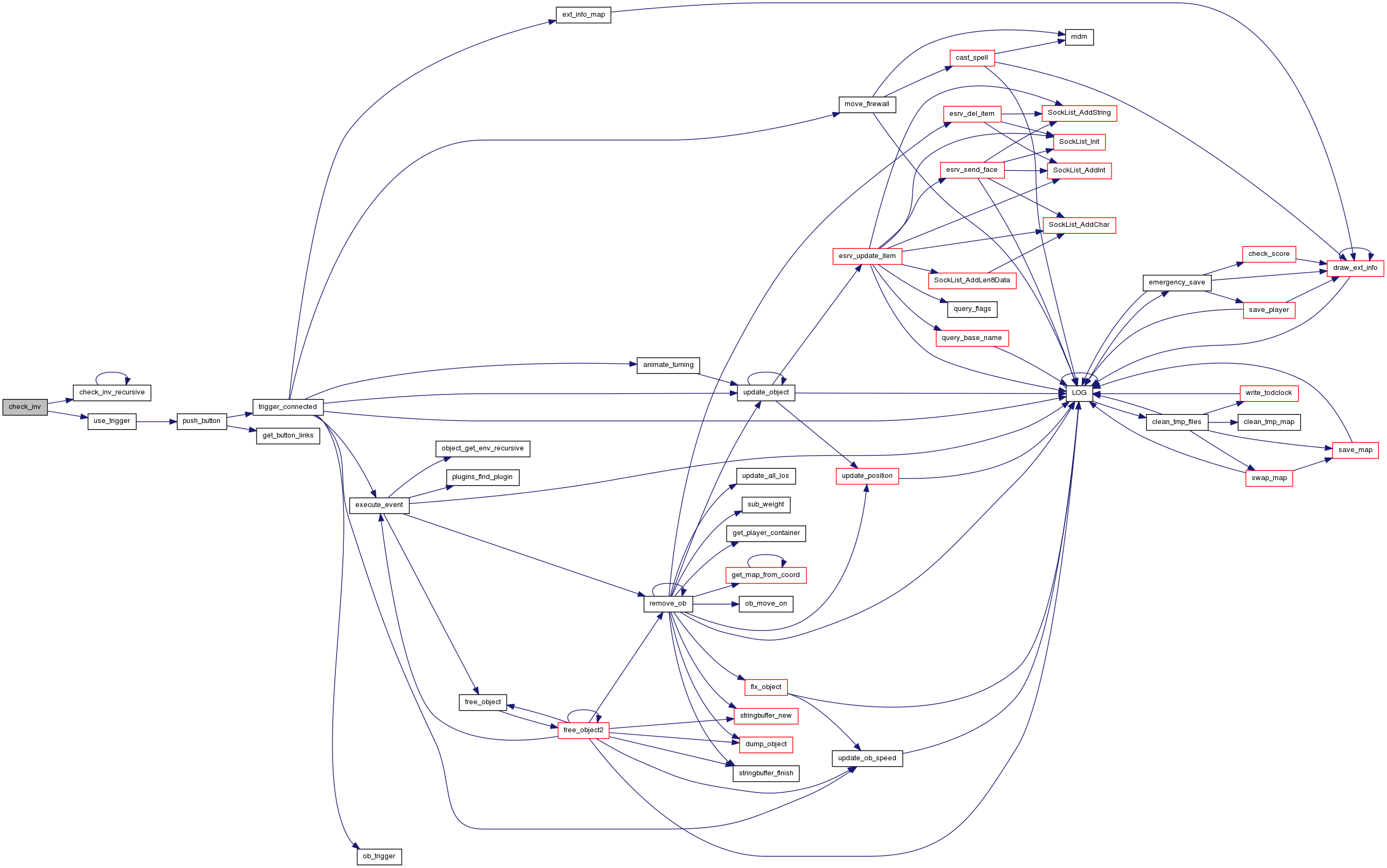

| object* check_inv_recursive | ( | object * | op, |
| const object * | trig | ||
| ) |
Checks object and its inventory for specific item.
It will descend through containers to find the object. slaying = match object slaying flag race = match object archetype name flag hp = match object type (excpt type '0'== PLAYER) title = match object title Searching by title only is not recommended, as it can be a rather slow operation; use it in combination with archetype or type.
- Parameters:
-
op object of which to search inventory trig what to search
- Returns:
- object that matches, or NULL if none matched.
Definition at line 788 of file button.c.
References check_inv_recursive().
Referenced by blocked_link(), cast_create_town_portal(), cfapi_object_check_inventory(), check_inv(), and check_inv_recursive().

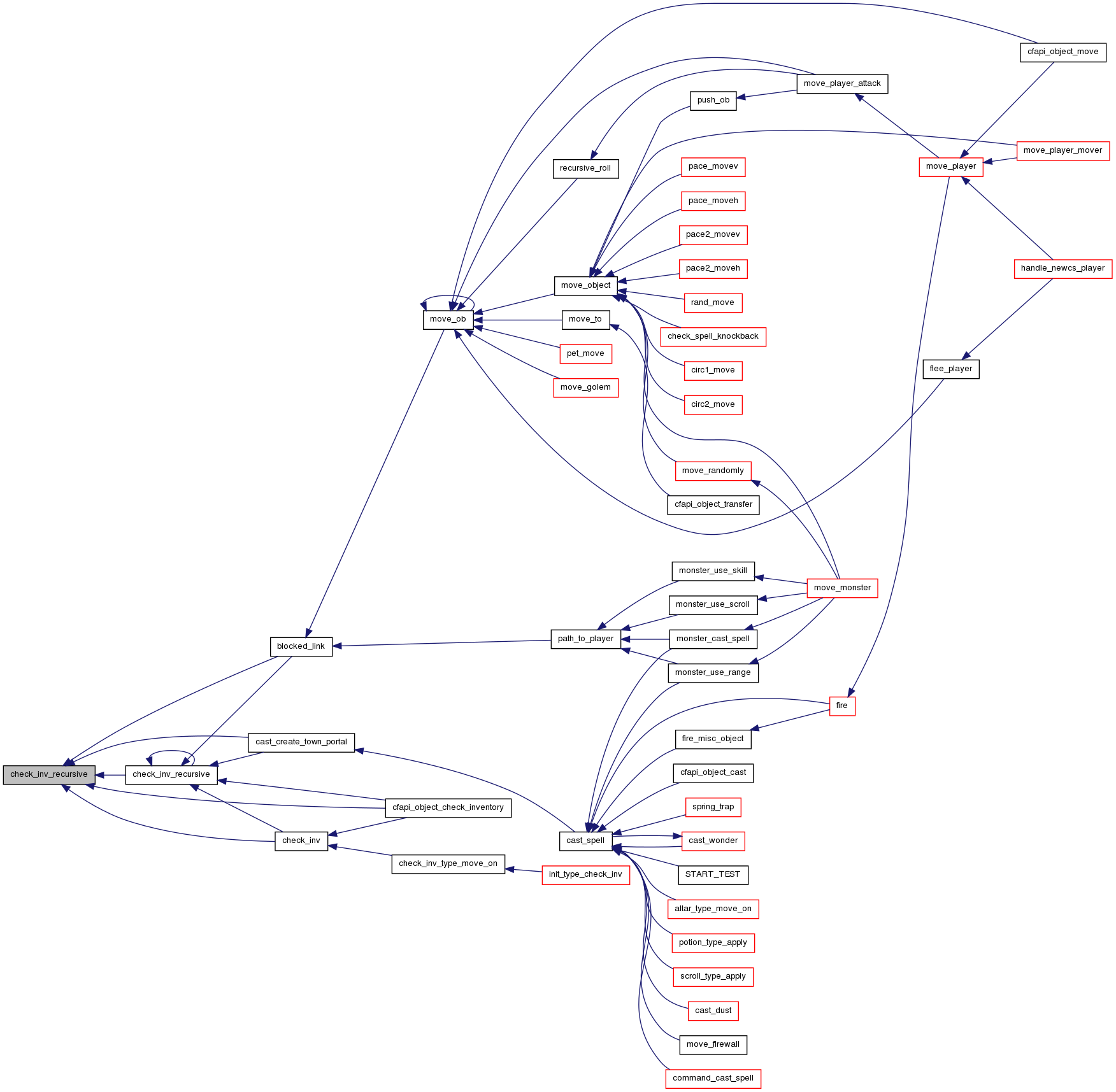
| int check_trigger | ( | object * | op, |
| object * | cause | ||
| ) |
- Todo:
- document properly cause != NULL: something has moved on top of op
cause == NULL: nothing has moved, we have been called from animate_trigger().
TRIGGER_ALTAR: Returns 1 if 'cause' was destroyed, 0 if not.
TRIGGER: Returns 1 if handle could be moved, 0 if not.
TRIGGER_BUTTON, TRIGGER_PEDESTAL: Returns 0.
Definition at line 525 of file button.c.
References llevDebug, LOG(), NUM_ANIMATIONS, operate_altar(), PLAYER, push(), SET_ANIMATION, TRIGGER, TRIGGER_ALTAR, TRIGGER_BUTTON, trigger_move(), TRIGGER_PEDESTAL, update_ob_speed(), and update_object().
Referenced by animate_trigger(), cfapi_object_check_trigger(), do_auto_apply(), fix_auto_apply(), trigger_altar_type_move_on(), trigger_button_type_move_on(), trigger_pedestal_type_move_on(), trigger_type_apply(), and trigger_type_process().
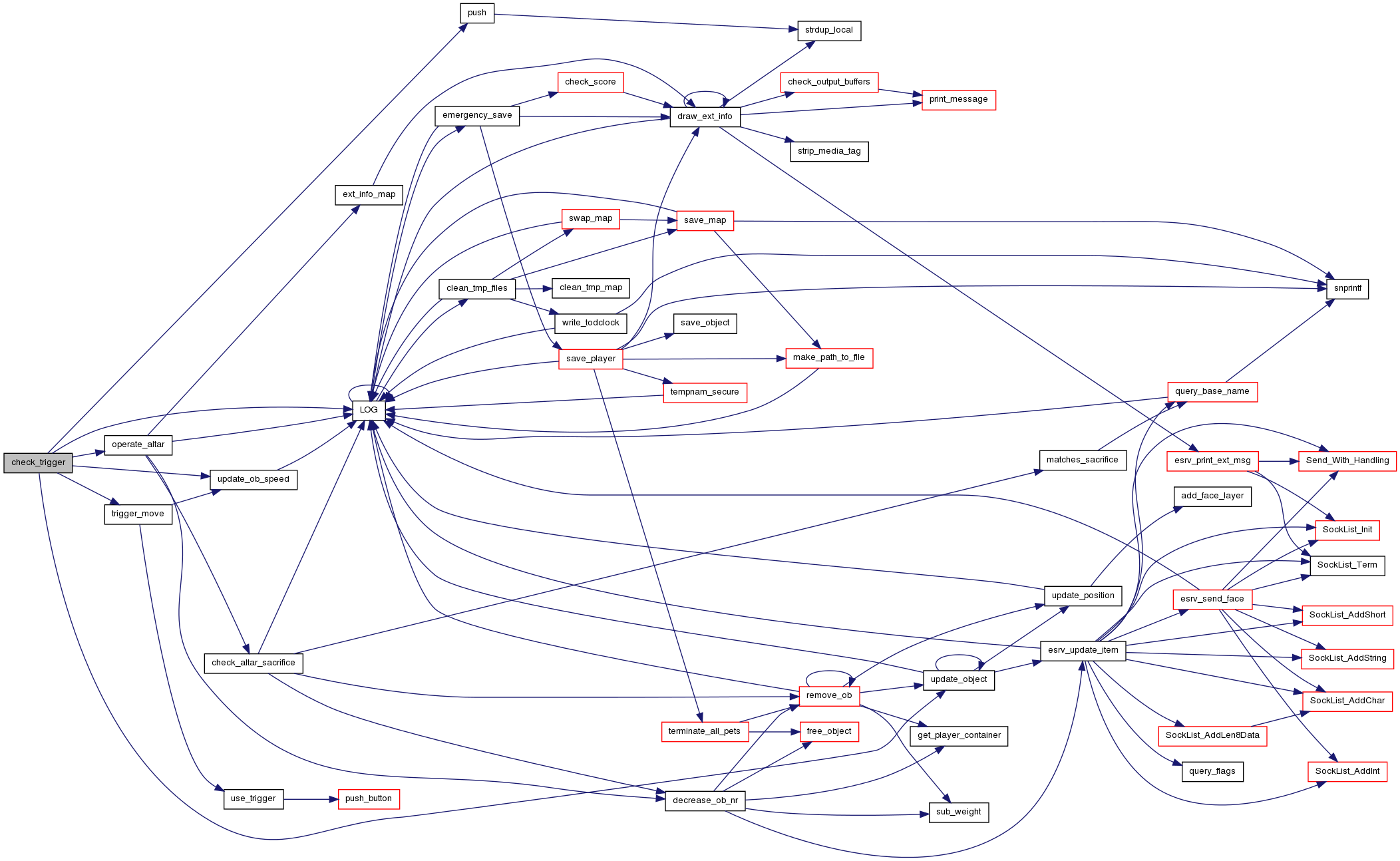
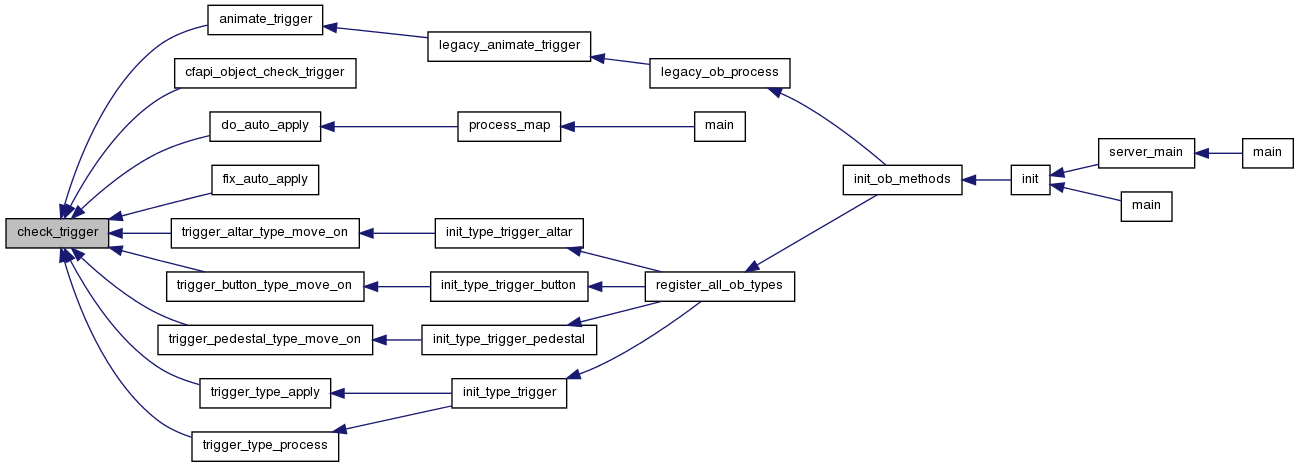
| static objectlink * get_button_links | ( | const object * | button | ) | [static] |
Return the first objectlink in the objects linked to this one.
- Parameters:
-
button object to check. Must not be NULL.
- Returns:
- ::objectlink for this object, or NULL.
Definition at line 734 of file button.c.
Referenced by push_button(), and update_button().
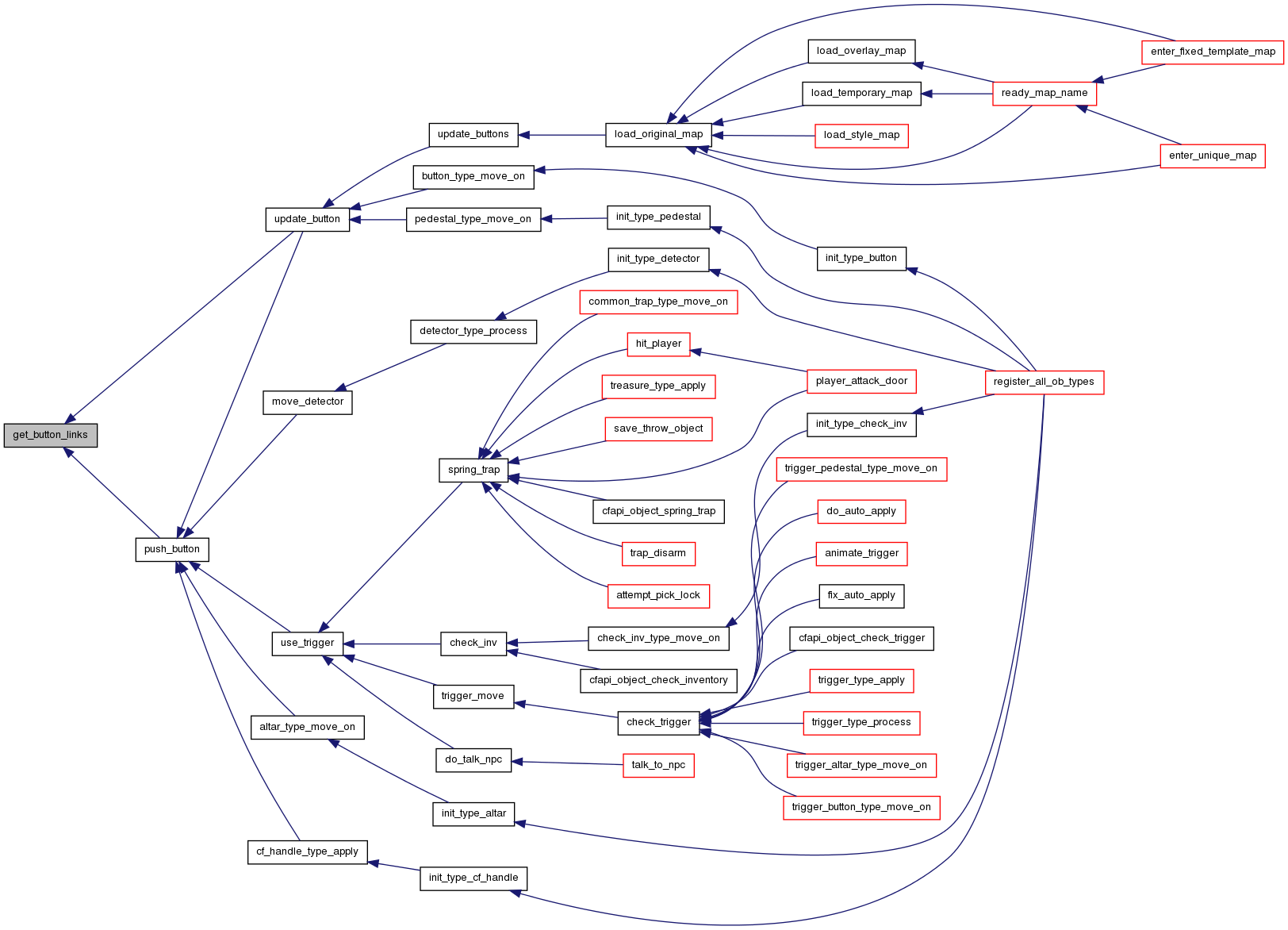
| int get_button_value | ( | const object * | button | ) |
| static int matches_sacrifice | ( | const object * | altar, |
| const object * | sacrifice | ||
| ) | [static] |
Helper function to check if the item matches altar's requested sacrifice.
The number of objects is not taken into account.
- Parameters:
-
altar altar we're checking for. Can't be NULL. sacrifice what object to check for. Can't be NULL.
- Returns:
- 1 if object is suitable for the altar (number not taken into account), 0 else.
Definition at line 305 of file button.c.
References ARCH_SACRIFICE, FLAG_ALIVE, FLAG_IS_LINKED, MAX_BUF, MONEY, PLAYER, query_base_name(), and QUERY_FLAG.
Referenced by check_altar_sacrifice().
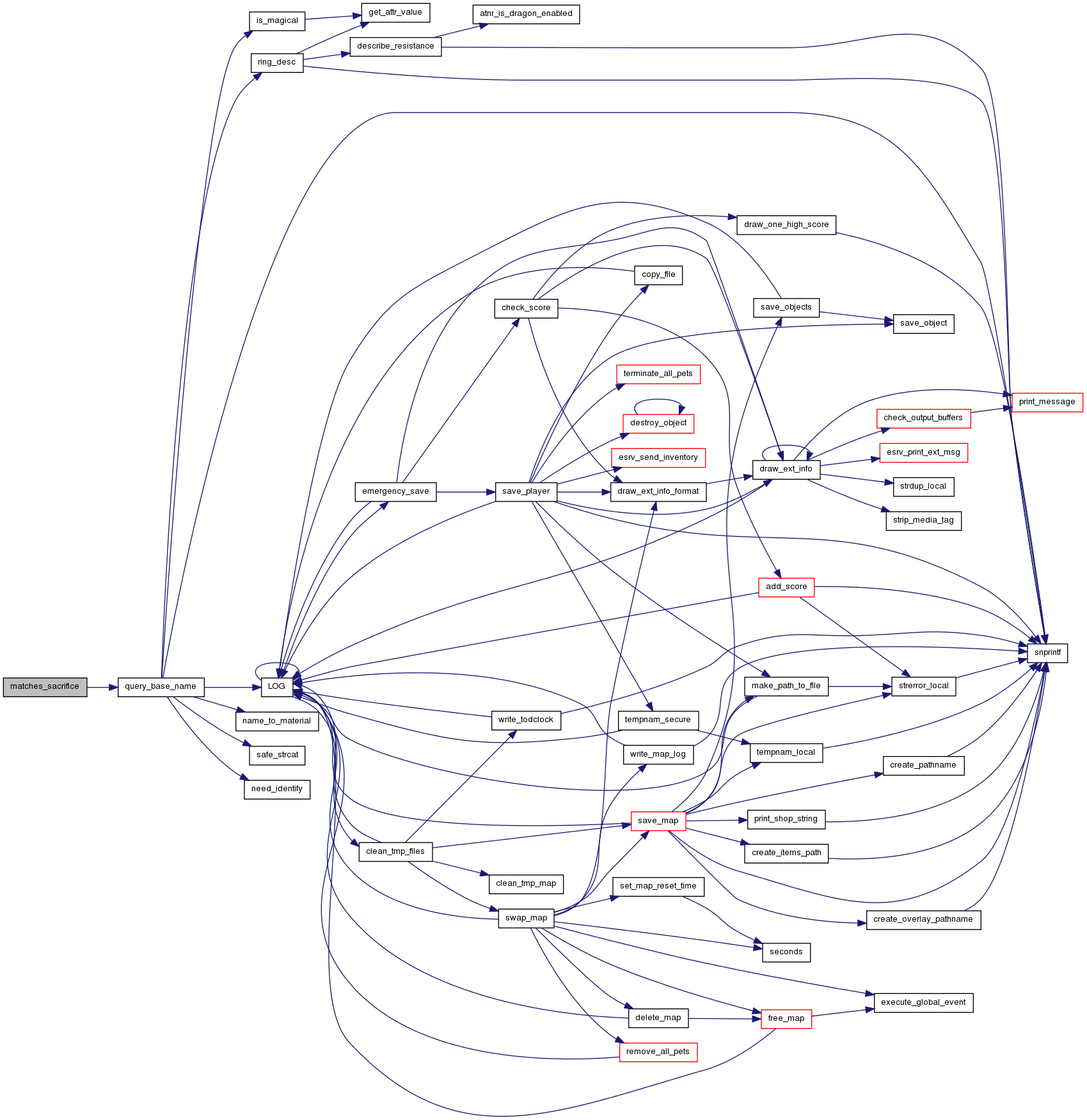

| int operate_altar | ( | object * | altar, |
| object ** | sacrifice | ||
| ) |
Checks if sacrifice was accepted and removes sacrificed objects.
Might be better to call check_altar_sacrifice (above) than depend on the return value, since operate_altar will remove the sacrifice also.
If this function returns 1, '*sacrifice' is modified to point to the remaining sacrifice, or is set to NULL if the sacrifice was used up.
- Parameters:
-
altar item to which there is a sacrifice sacrifice object that may be sacrifed
- Returns:
- 1 if sacrifice was accepted, else 0
Definition at line 470 of file button.c.
References check_altar_sacrifice(), decrease_ob_nr(), ext_info_map(), llevError, LOG(), MSG_TYPE_DIALOG, MSG_TYPE_DIALOG_ALTAR, and NDI_BLACK.
Referenced by altar_type_move_on(), check_trigger(), and identify_altar_type_move_on().

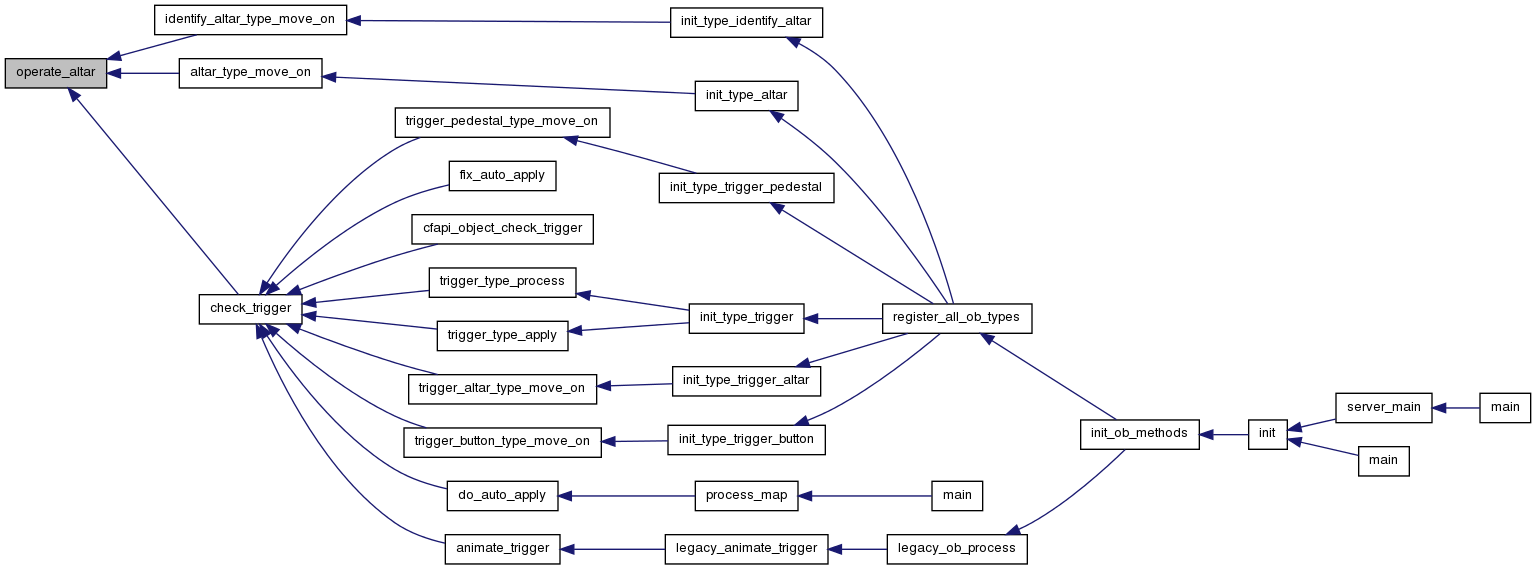
| void push_button | ( | object * | op | ) |
Push the specified object.
This can affect other buttons/gates/handles altars/pedestals/holes in the whole map. Changed the routine to loop through _all_ linked objects. Better hurry with that linked list...
- Parameters:
-
op object to push.
Definition at line 165 of file button.c.
References get_button_links(), and trigger_connected().
Referenced by altar_type_move_on(), cf_handle_type_apply(), move_detector(), update_button(), and use_trigger().
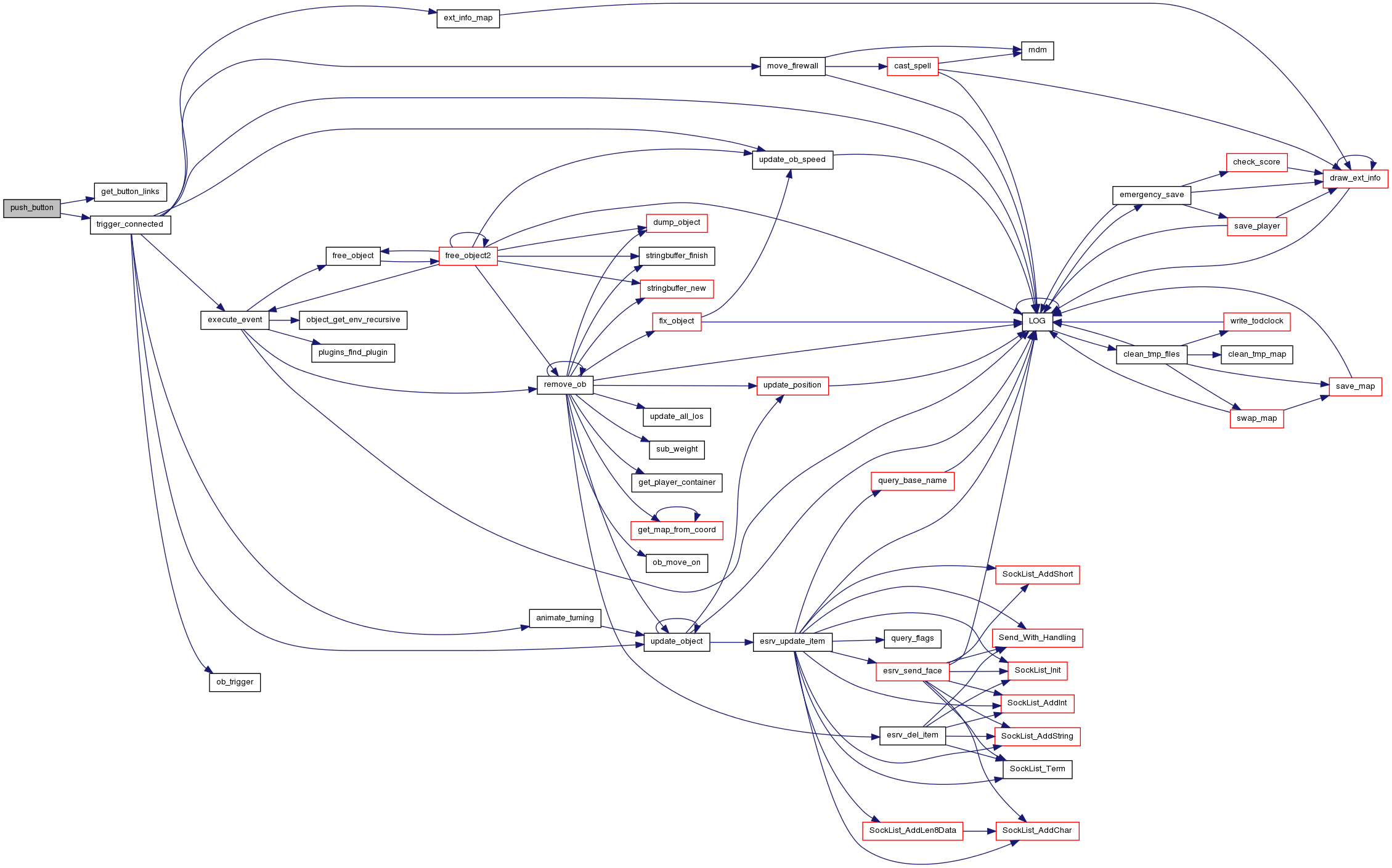
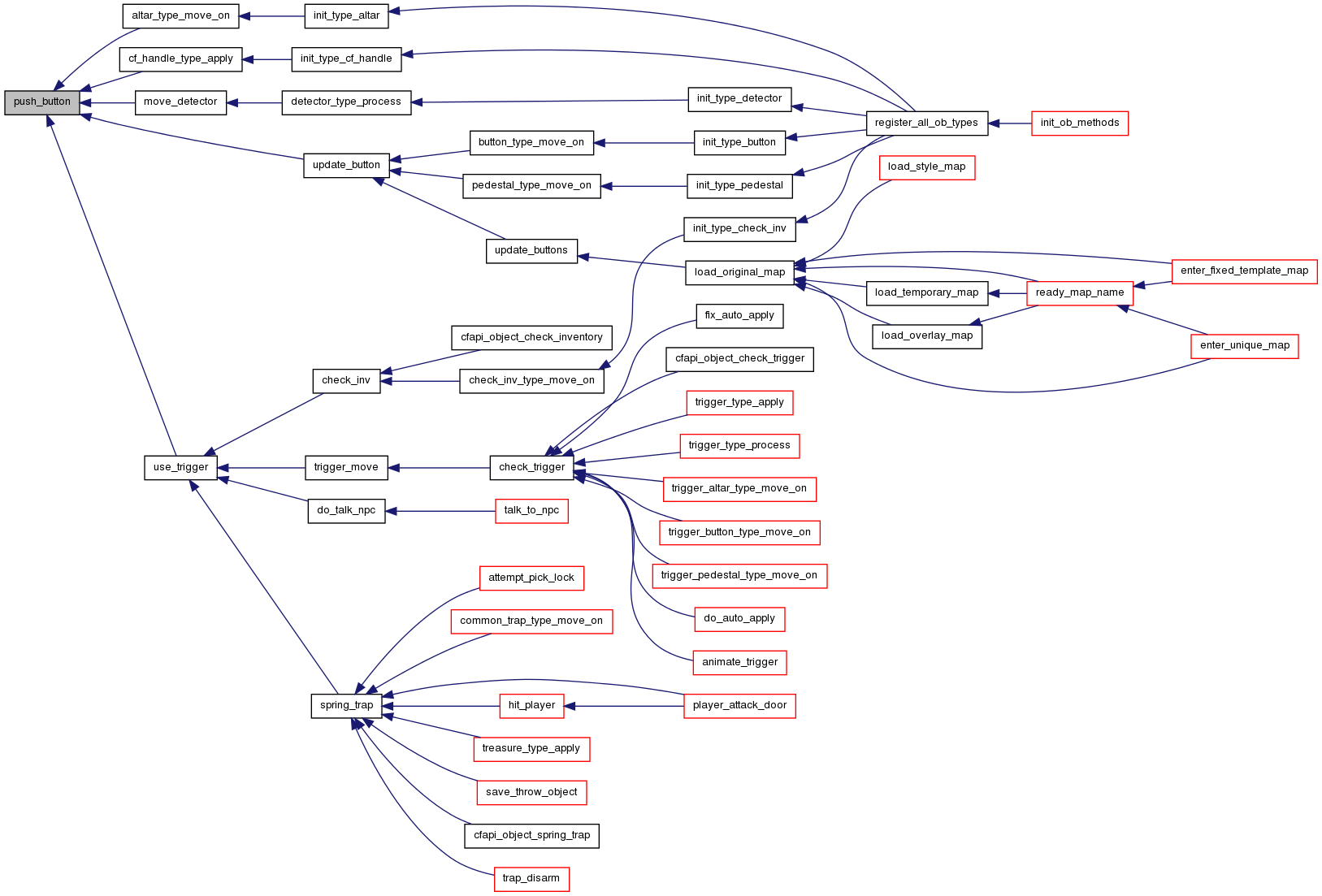
| void remove_button_link | ( | object * | op | ) |
Remove the object from the linked lists of buttons in the map.
This is only needed by editors.
- Parameters:
-
op object to remove. Must be on a map, and linked.
Definition at line 700 of file button.c.
References CLEAR_FLAG, FLAG_IS_LINKED, llevError, LOG(), and QUERY_FLAG.
Referenced by apply_builder_remove(), clean_object(), and delete_unique_items().
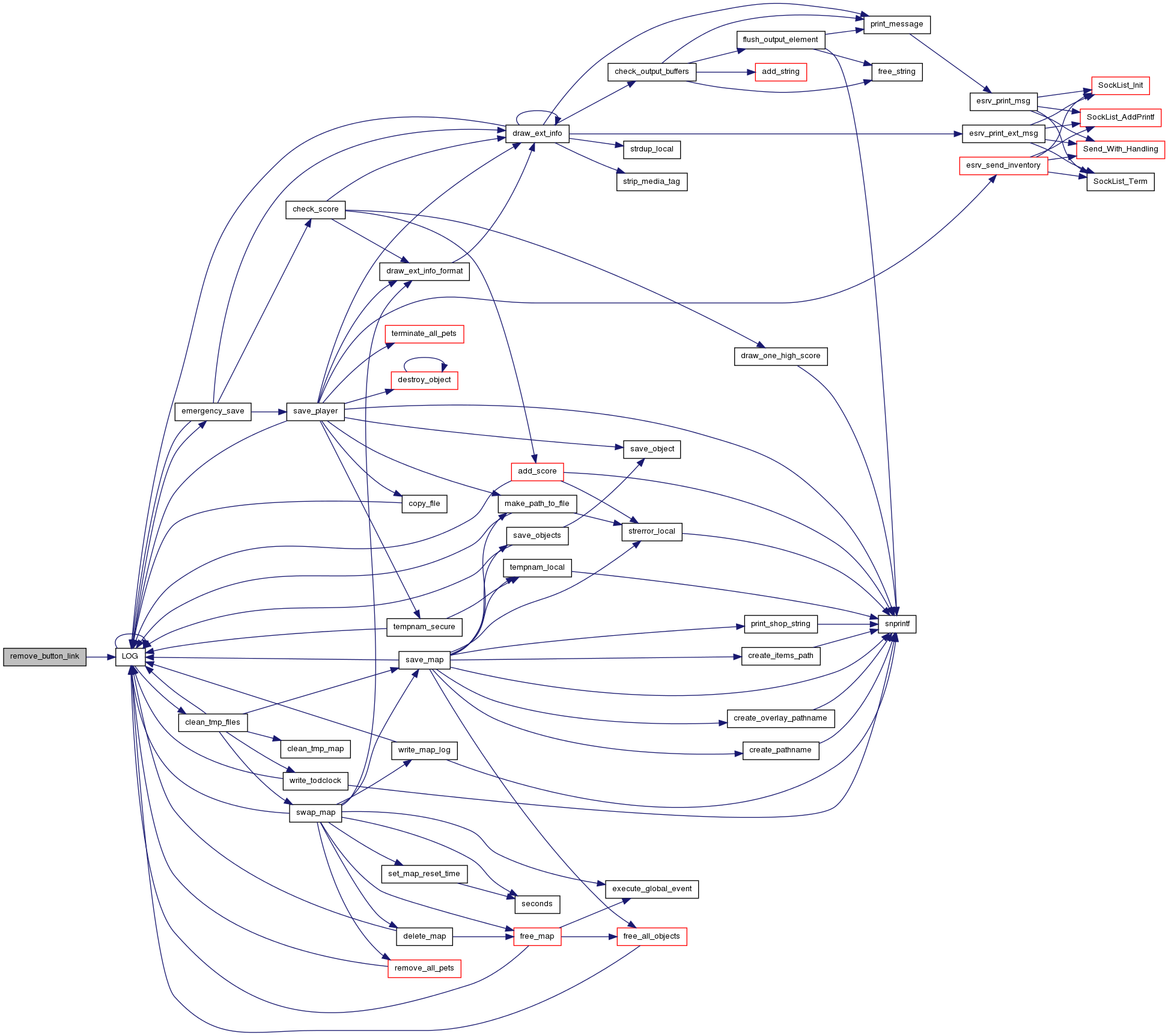
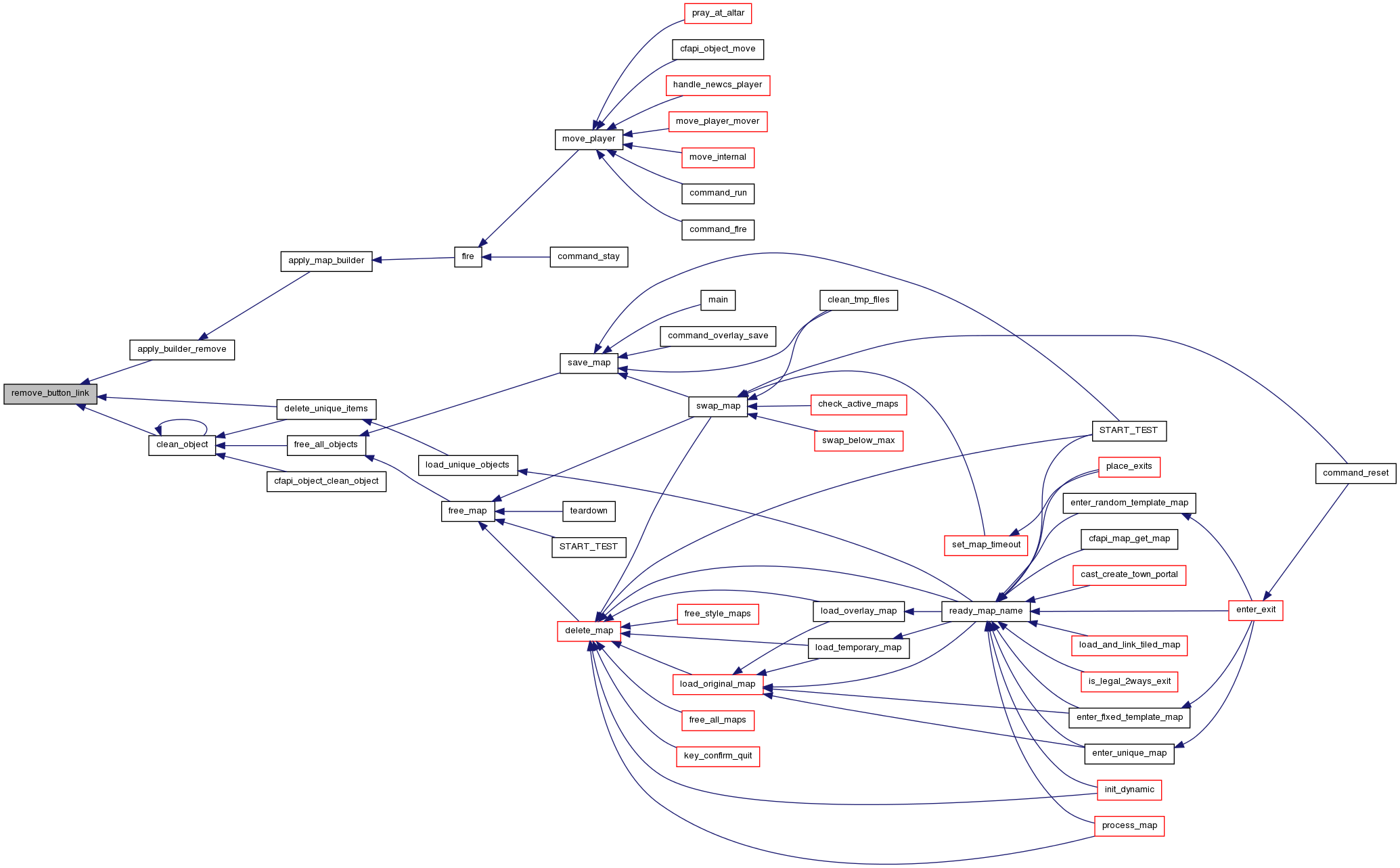
| void trigger_connected | ( | objectlink * | ol, |
| object * | cause, | ||
| const int | state | ||
| ) |
Trigger every object in an objectlink.
This was originally part of push_button but has been extracted to make it possible to trigger the connected object on a map from a plugin without requiring a source object. This method will take care of calling EVENT_TRIGGER of all elligible object in list (see state parameter)
- Parameters:
-
ol the objectlink to trigger. This can be acquire from map cause the object that cause this path to trigger, may be NULL state which object to apply. 0=all object with FLAG_ACTIVATE_ON_PUSH other=all object with FLAG_ACTIVATE_ON_RELEASE
Definition at line 52 of file button.c.
References ALTAR, animate_turning(), BUTTON, CF_HANDLE, DIRECTOR, EVENT_TRIGGER, execute_event(), ext_info_map(), FIREWALL, FLAG_ACTIVATE_ON_PUSH, FLAG_ACTIVATE_ON_RELEASE, FLAG_ANIMATE, FLAG_FREED, GATE, HOLE, llevError, LOG(), move_firewall(), MSG_SUBTYPE_NONE, MSG_TYPE_SIGN, NDI_NAVY, NDI_UNIQUE, ob_trigger(), PEDESTAL, QUERY_FLAG, SCRIPT_FIX_ALL, SET_ANIMATION, SIGN, TIMED_GATE, update_ob_speed(), and update_object().
Referenced by cfapi_map_trigger_connected(), and push_button().
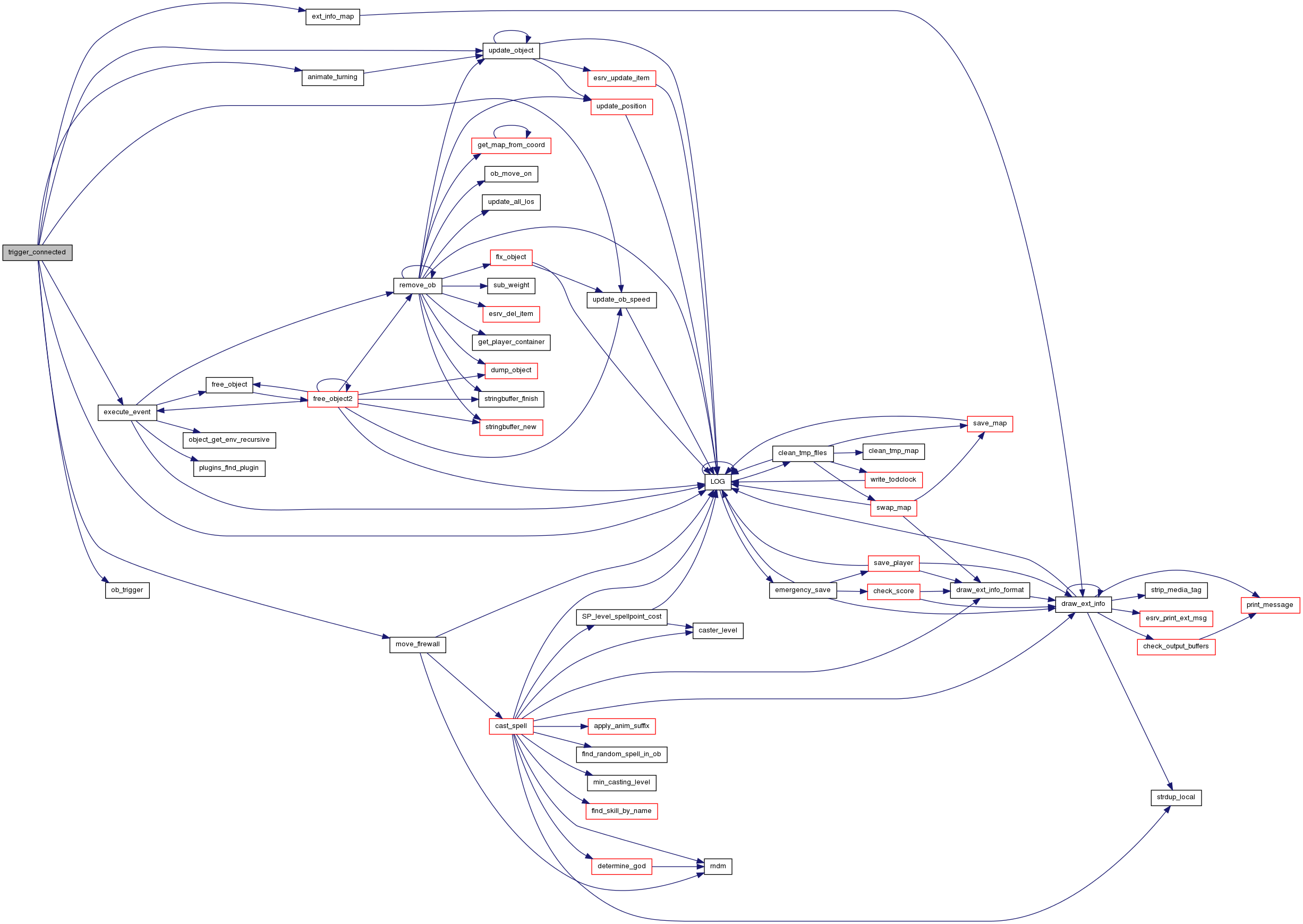
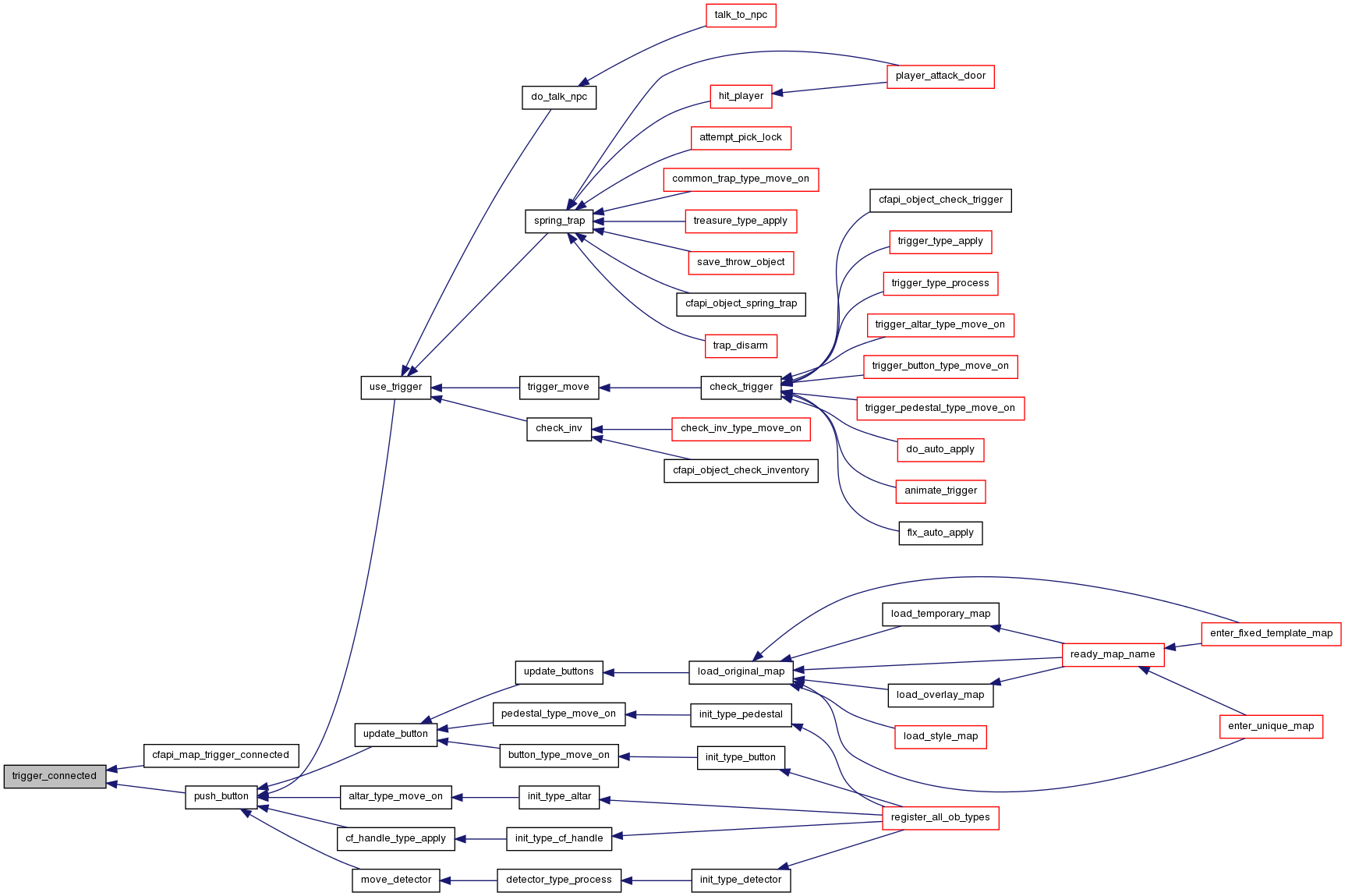
| static void trigger_move | ( | object * | op, |
| int | state | ||
| ) | [static] |
- Todo:
- document?
Definition at line 495 of file button.c.
References update_ob_speed(), and use_trigger().
Referenced by check_trigger().
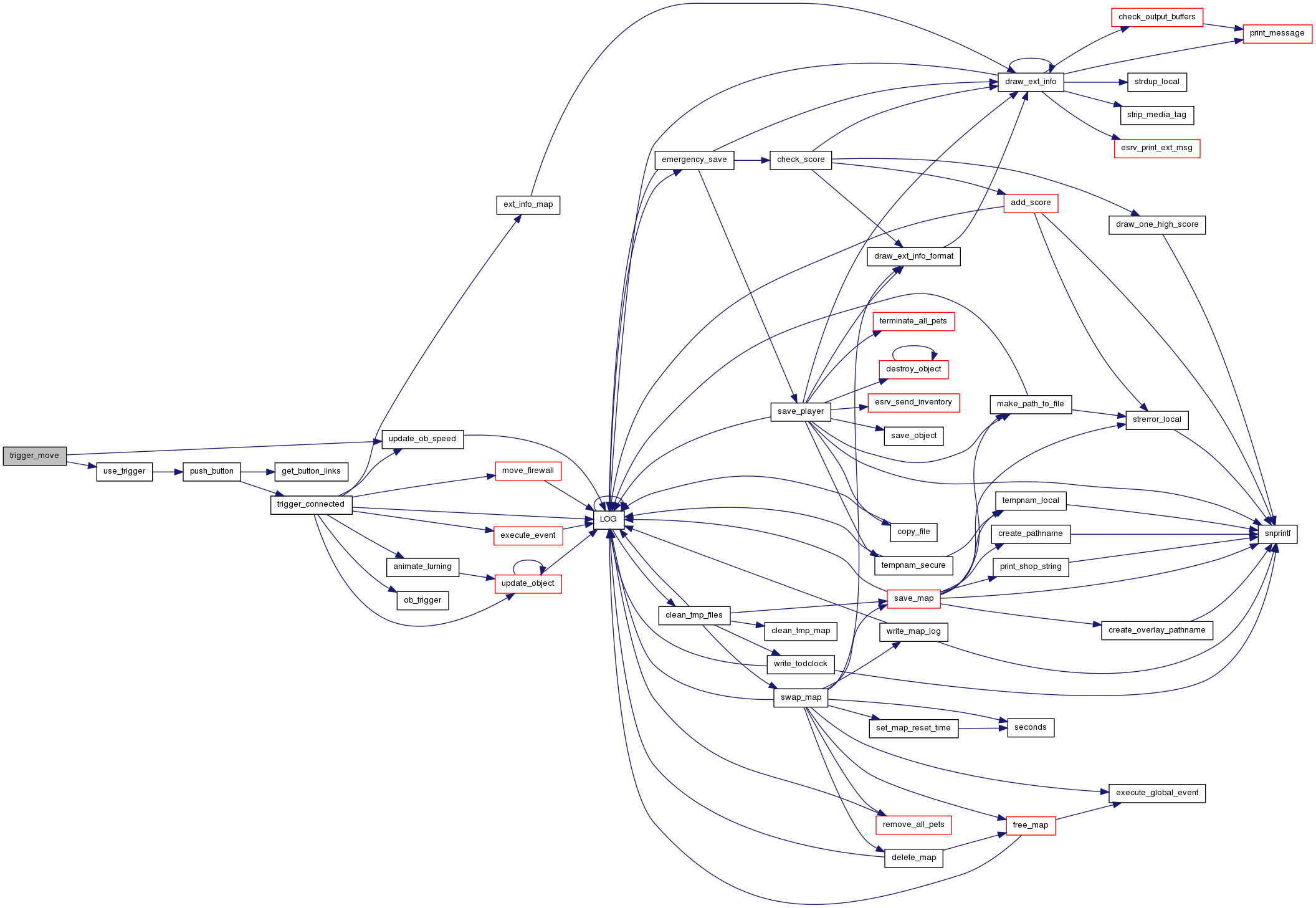

| void update_button | ( | object * | op | ) |
Updates everything connected with the button op.
After changing the state of a button, this function must be called to make sure that all gates and other buttons connected to the button reacts to the (eventual) change of state.
- Parameters:
-
op object to update.
Definition at line 178 of file button.c.
References BUTTON, get_button_links(), llevDebug, LOG(), PEDESTAL, PLAYER, push_button(), SET_ANIMATION, SPECIAL_KEY, and update_object().
Referenced by button_type_move_on(), pedestal_type_move_on(), and update_buttons().
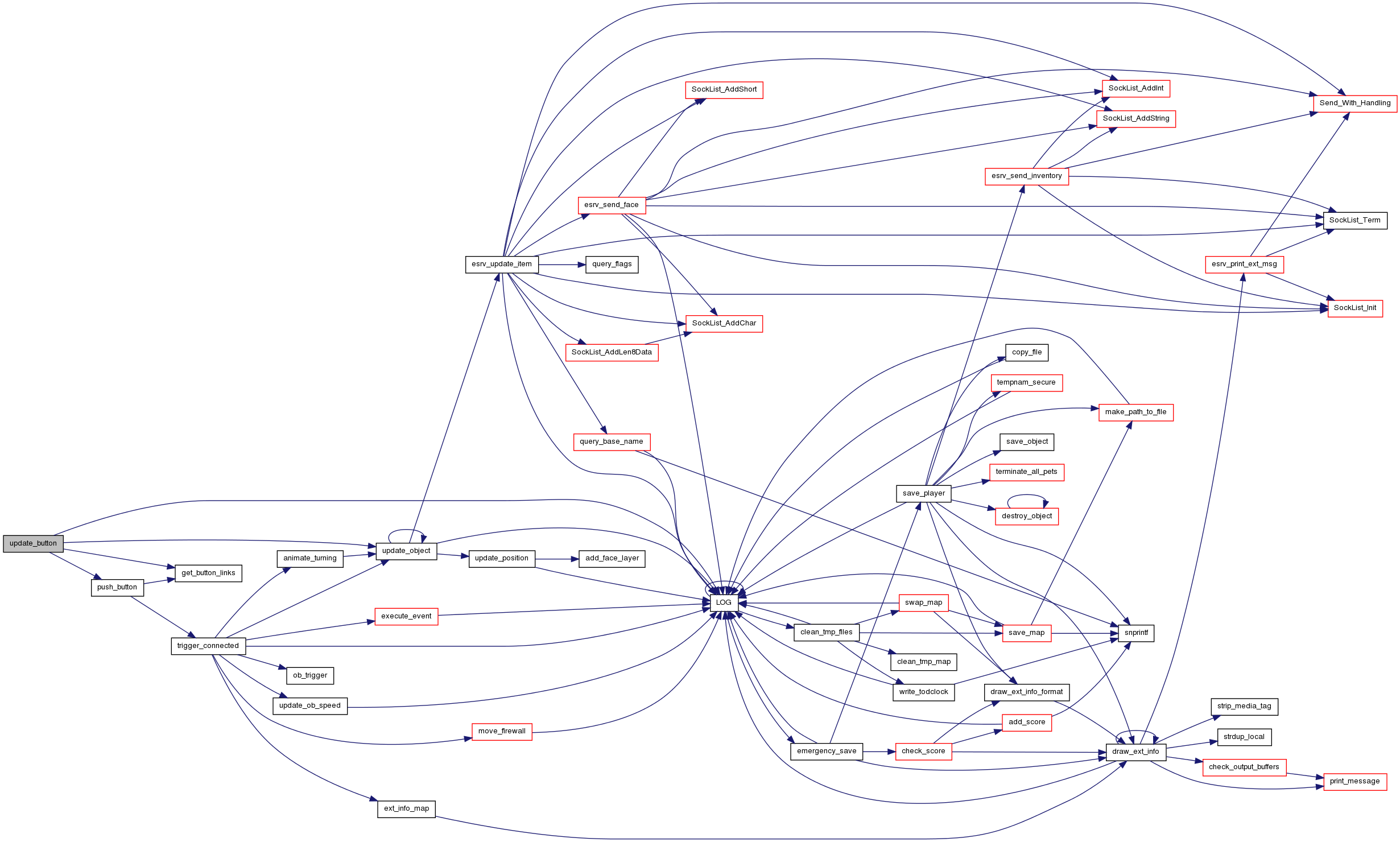
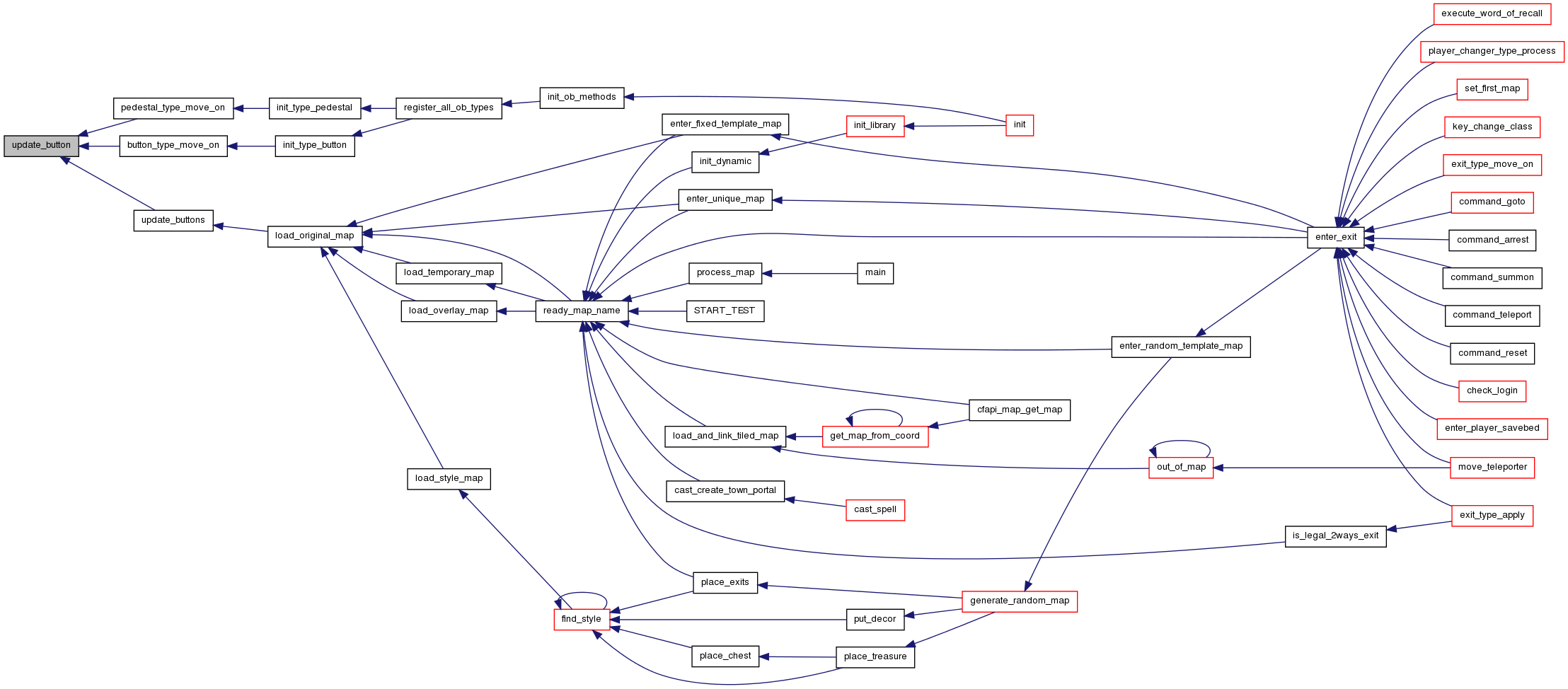
| void update_buttons | ( | mapstruct * | m | ) |
Updates every button on the map (by calling update_button() for them).
Definition at line 241 of file button.c.
References BUTTON, mapdef::buttons, llevError, LOG(), PEDESTAL, and update_button().
Referenced by load_original_map().
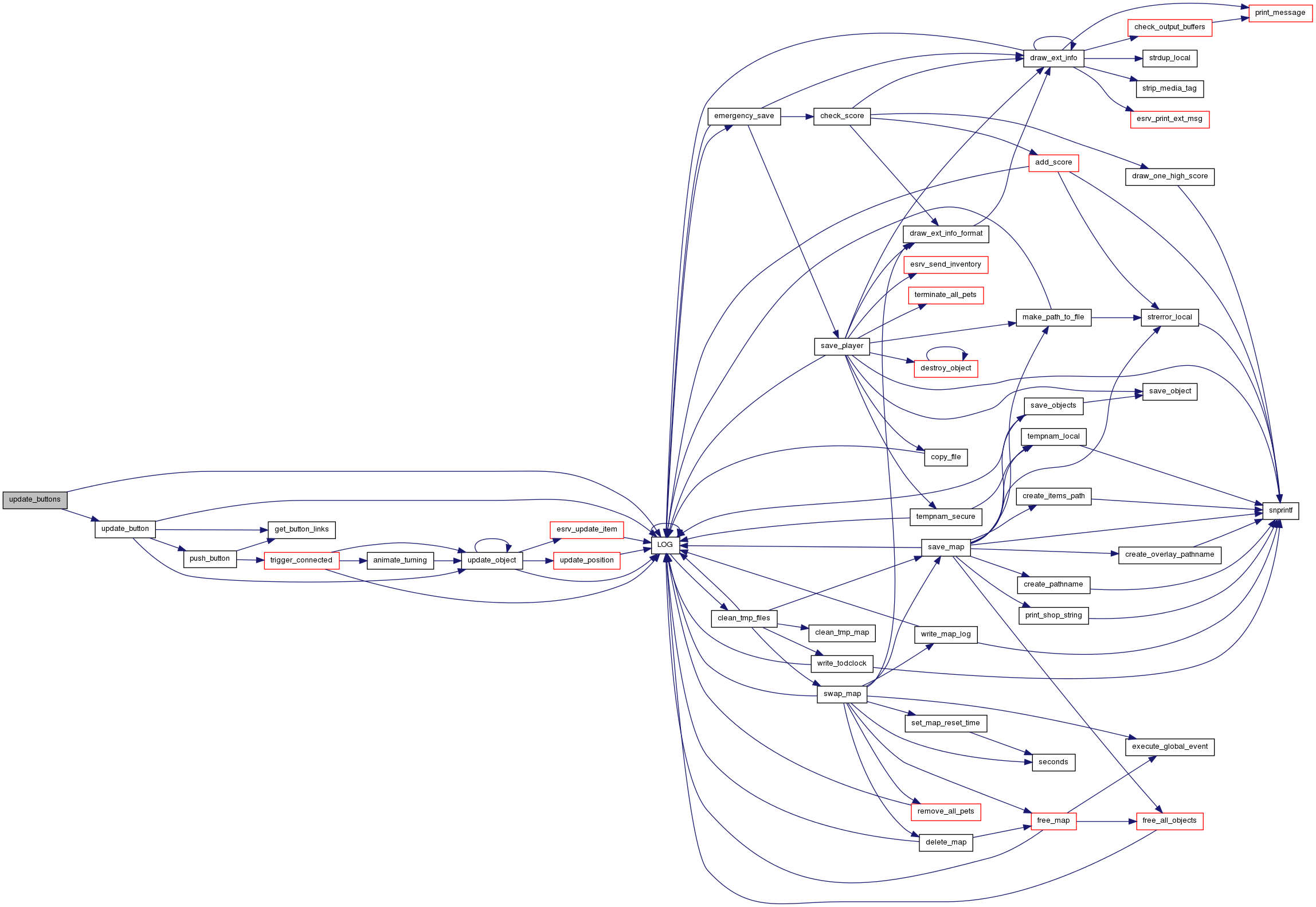
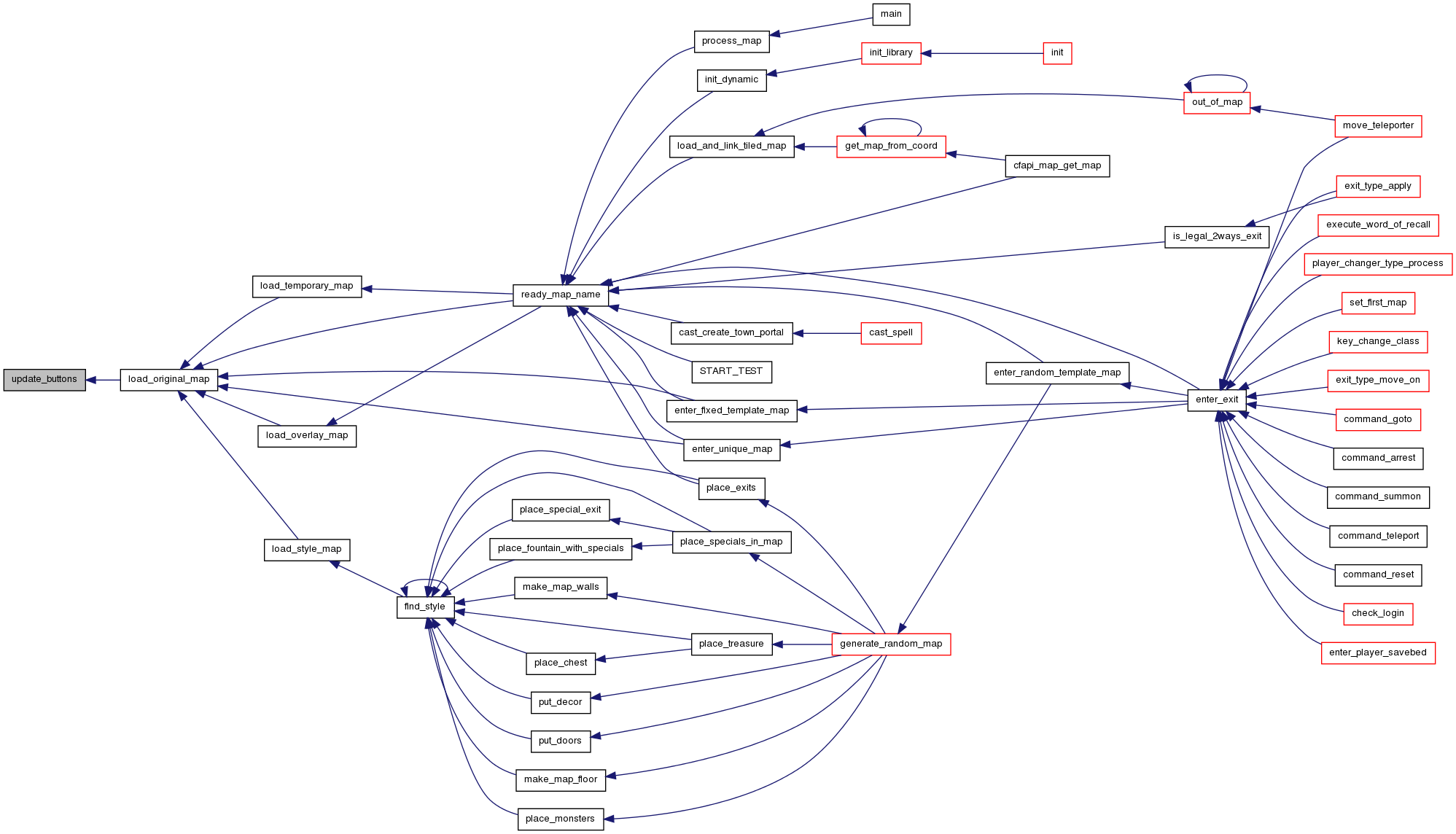
| void use_trigger | ( | object * | op | ) |
Toggles the state of specified button.
- Parameters:
-
op object to toggle.
Definition at line 268 of file button.c.
References push_button().
Referenced by check_inv(), do_talk_npc(), spring_trap(), and trigger_move().
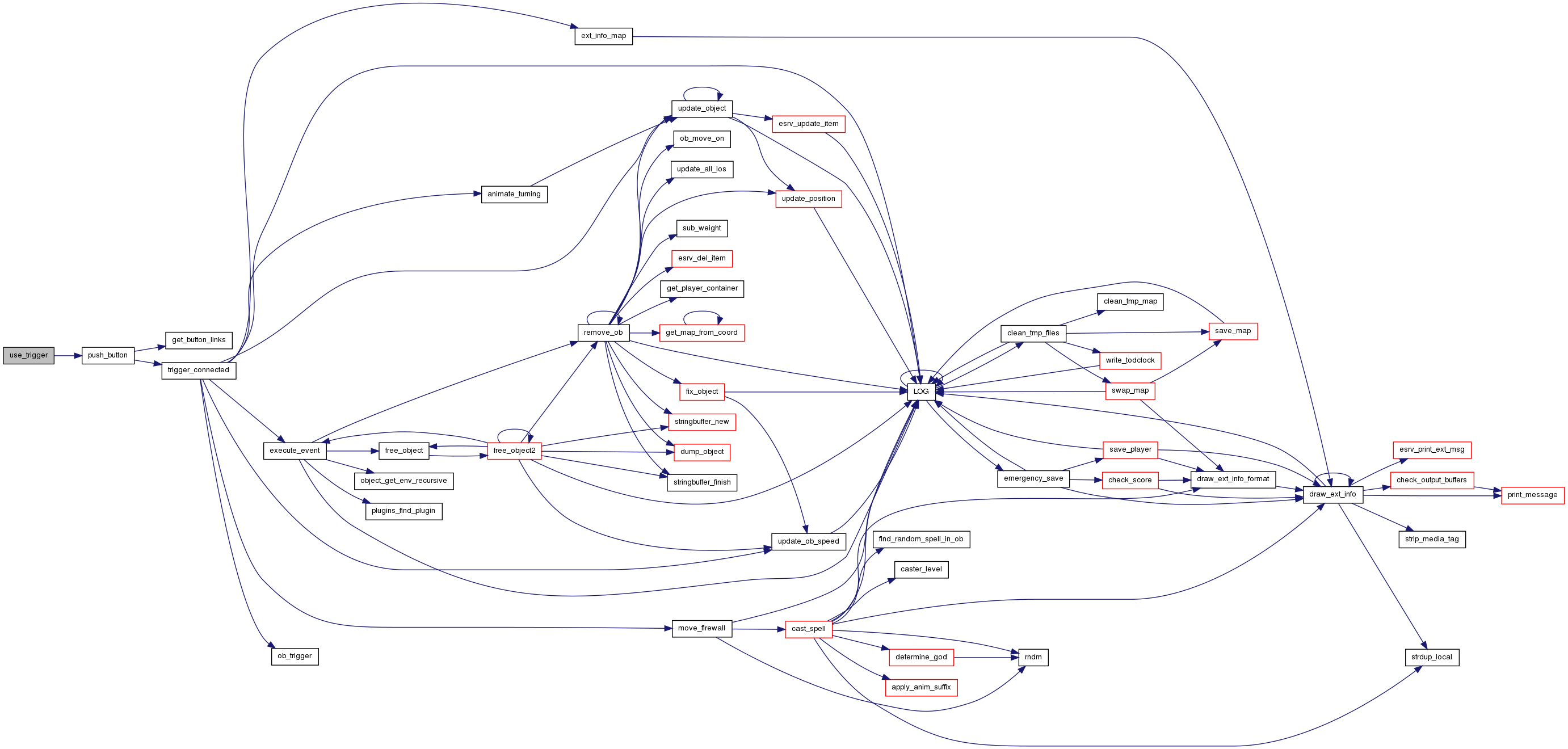
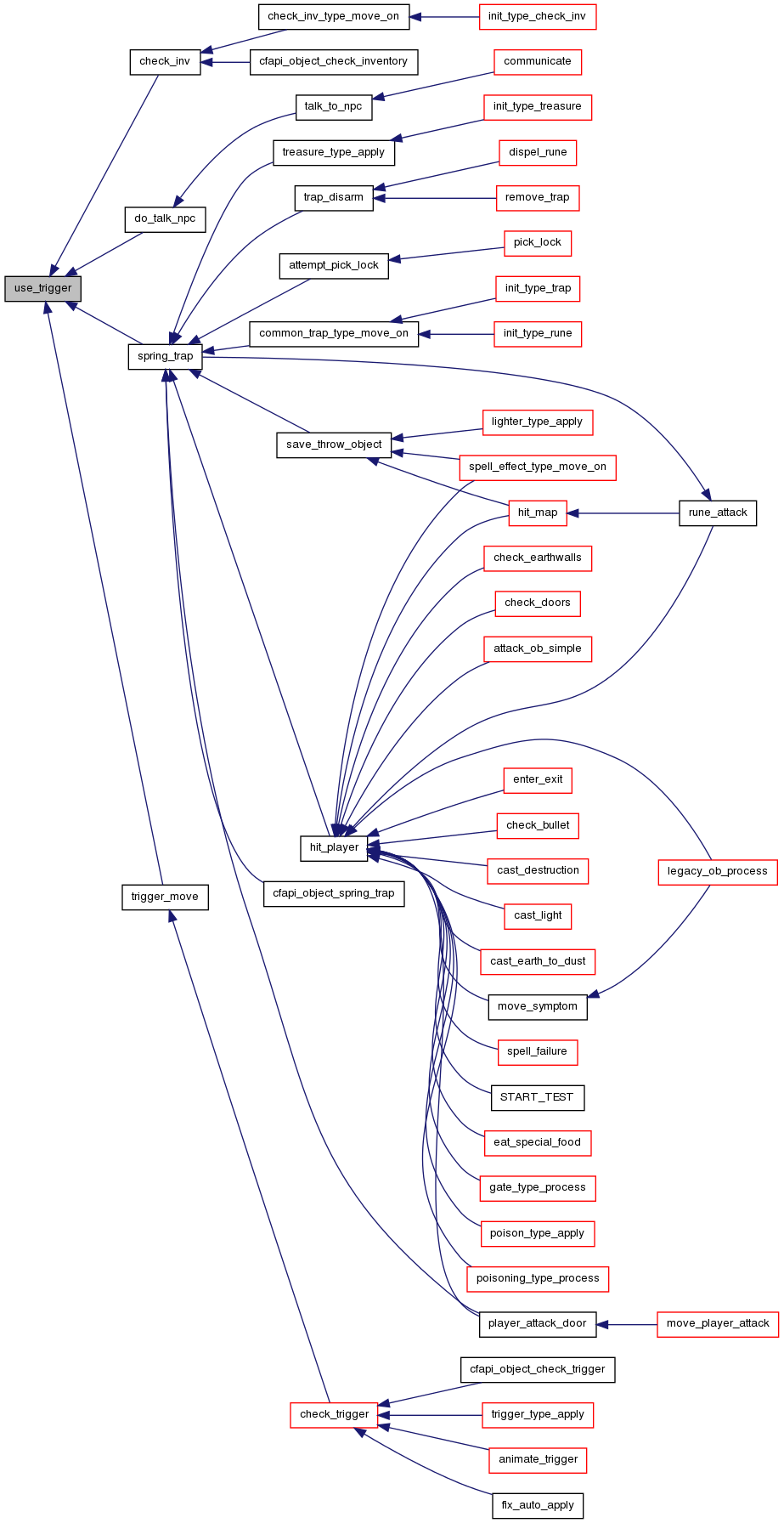
| void verify_button_links | ( | const mapstruct * | map | ) |
This does a minimal check of the button link consistency for object map.
All it really does it much sure the object id link that is set matches what the object has.
Will log to error level.
- Parameters:
-
map map to check.
Definition at line 853 of file button.c.
References mapdef::buttons, llevError, and LOG().
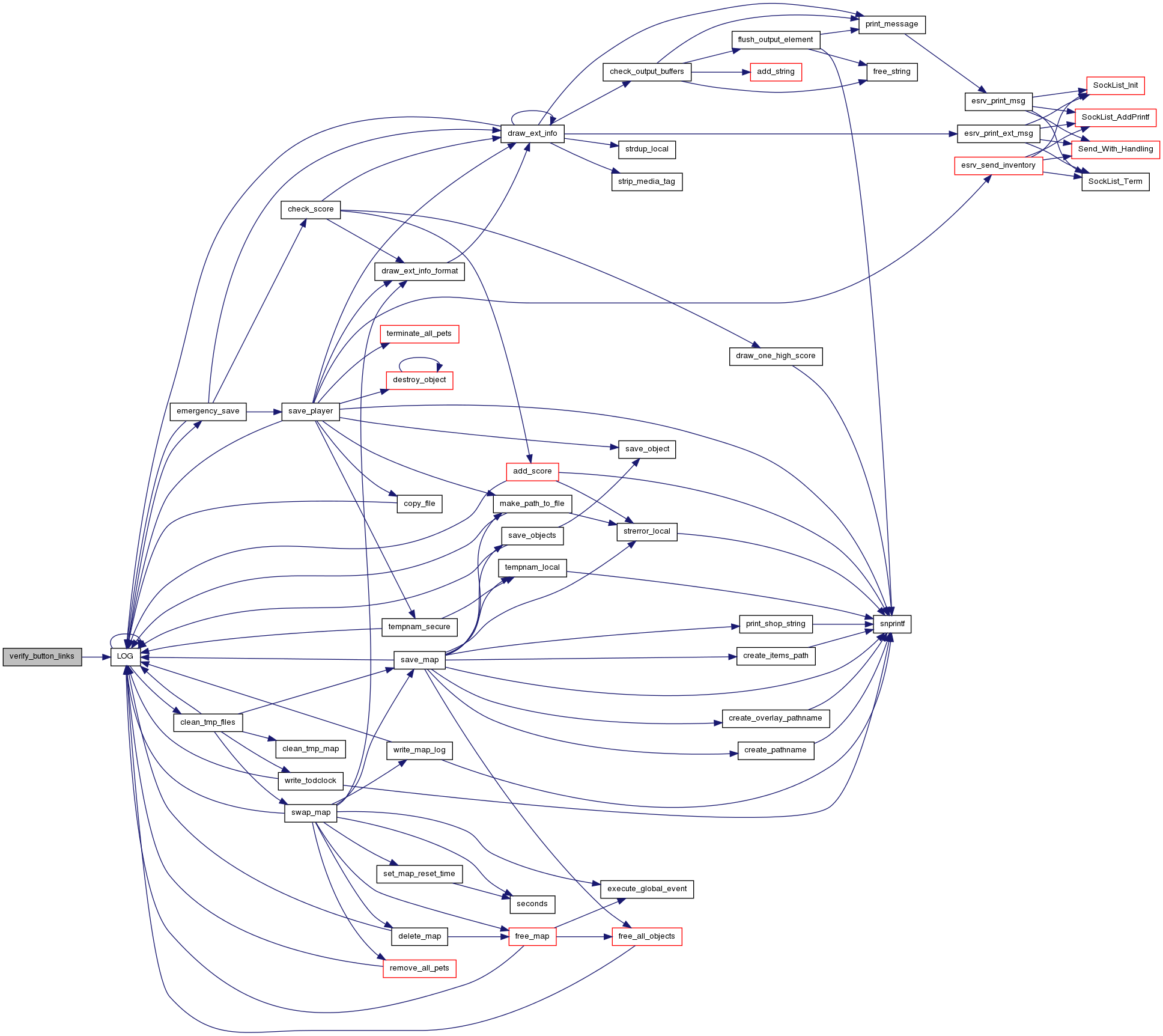
 1.7.6.1
1.7.6.1